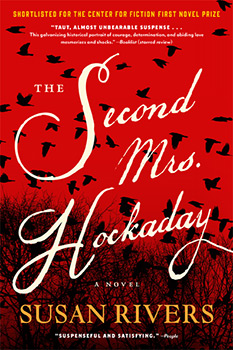Summary | Excerpt | Reading Guide | Discuss | Reviews | Beyond the Book | Readalikes | Genres & Themes | Author Bio

3982 Glenn Springs Road,
GLENN SPRINGS, SOUTH CAROLINA
September 29, 1865
Dear Millie, Dr. Gordon knew my father when they were students at South Carolina College. He did not realize whose daughter I was when he performed the examination of my baby's remains; that is how I am assured of his objectivity, a rare attribute in local people of my acquaintance. While the extent of decomposition prevented a conclusive cause of death, the doctor reports that the child did not suffer trauma, and while drowning or suffocation cannot be entirely ruled out, he concludes that he most likely died of exposure. It was not the doctor's opinion that I exposed the baby intentionally — that accusation comes from the magistrate. The doctor asked to speak to me, however, after examining the remains, and that is when we discovered our connection. I learned what an empathetic man he is (also rare). When Dr. Gordon's son was fighting at Second Manassas, his young wife, unbeknownst to her husband, was dying along with her breeched infant in Leesville. The doctor was in Richmond on work for the government at the time, or would have been at his daughter- in- law's side. In the aftermath, he worried that his son had developed a very dark out - look, believing there was little purpose in his soldiering when it had cost him the souls dearest to him. Dr. Gordon tells me that he has worked hard to persuade his son that there is a time for war, and when war has been put behind us at last, people will find a way to mend their lives and go back to the full enjoyment of life. That is our natural inclination, he says, and I understand that he means to be encouraging where the major and I are concerned. The soldiers who have lost much will be dissatisfied and angry for a time, he tells me, and may, in their confusion, lash out at the people fondest of them. This will be truest for those who served most loyally, yet for all their courage and purity of purpose found themselves in the ranks of the vanquished, trudging home with little more than the shirts on their backs. It will be more difficult for these warriors, he counsels. They have buried so many comrades, only to find that deliverance will elude them unless they can also bury their shame.
As for my reunion with the major, the moment was unlike anything I expected, despite the fact that I had rehearsed all plausible scenarios a hundred times in the months before he finally returned. Such a gulf stood between us, such a tumult of unexpressed emotions and thoughts, that we were rendered nearly mute by the anomalous quality of our encounter. I do remember that he asked me questions which I tried to answer honestly, if I could do so without implicating others. I took him to the spot beneath the swamp- rose where the child was buried. He wept (I had never seen a man do such), but whether it was for the child, for my sake, or for the wrong done him, I could not determine. One thing was fully evident: he is not the same man. Nor am I the same woman. Our experiences have marked us. Shaped us. And none of those experiences are shared. His hand looks strange with the middle fingers missing; more significantly, Millie, Gryffth has lost that raptor- sight that characterized his intelligence so splendidly. His dark eyes are flat — no longer interpreting, discriminating, divining. Maybe he had to sacrifice that gift in order to survive. Or perhaps it was torn from him in the violent battery of war. But now he only sees what is set before him. That is all he wants to see. Or needs to.
In marveling at how transformed he is, I strive to keep in mind that I am changed quite as totally as the major. It is challenging to remember the child who stood up before Rev. Poteat two years ago with a handful of spring flowers and a joyous heart, who trusted her fate to the good luck she had been born with and to a man blown into her path by the prevailing winds. Cousin, you asked me what transpired when I spoke with Major Hockaday on the morning of our wedding, after I told my father I would see my suitor before making a final decision. I shall tell you, but I doubt it will provide the unifying explanation your mind seeks.
Excerpted from The Second Mrs. Hockaday by Susan Rivers. Copyright © 2017 by Susan Rivers. Excerpted by permission of Algonquin Books. All rights reserved. No part of this excerpt may be reproduced or reprinted without permission in writing from the publisher.
If you want to build a ship, don't drum up people... but rather teach them to long for the endless immensity of the...
Click Here to find out who said this, as well as discovering other famous literary quotes!
Your guide toexceptional books
BookBrowse seeks out and recommends the best in contemporary fiction and nonfiction—books that not only engage and entertain but also deepen our understanding of ourselves and the world around us.